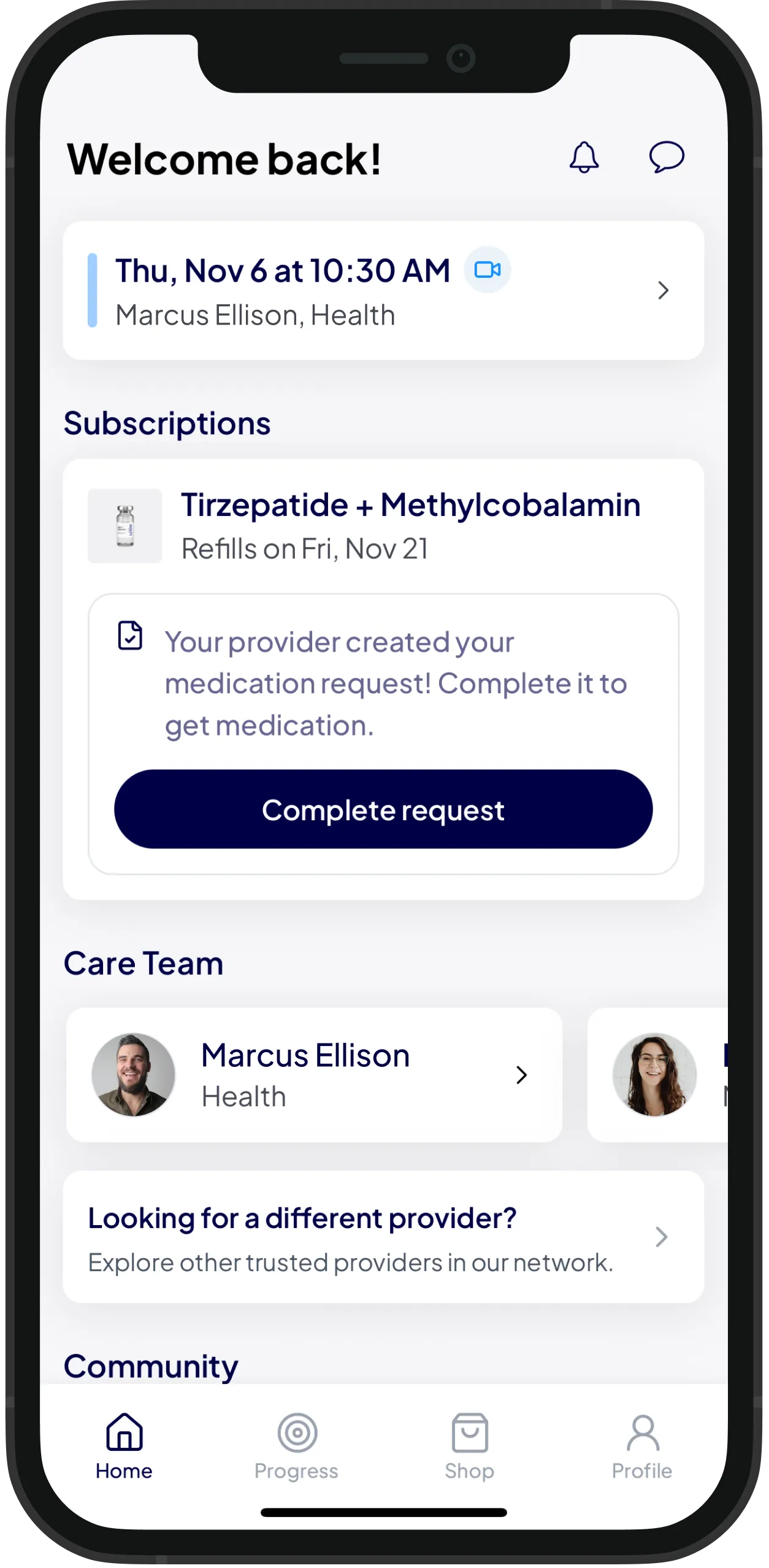Ready to transform your health?
Unlock access to expert guidance and a weight care plan crafted just for you.
Ready to transform your health?
Unlock access to expert guidance and a weight care plan crafted just for you.
Similar Articles
Similar Articles


GLP-1s for Athletes: Performance, Body Composition, and Recovery
GLP-1s for Athletes: Performance, Body Composition, and Recovery


What Labs Should You Monitor on GLP-1s? A Complete Biomarker Guide
What Labs Should You Monitor on GLP-1s? A Complete Biomarker Guide


Does Semaglutide Affect Fertility or Pregnancy?
Does Semaglutide Affect Fertility or Pregnancy?
Diagnosing Binge Eating Disorder (BED)
Diagnosing Binge Eating Disorder (BED)
Diagnosing Binge Eating Disorder (BED)
Although not often discussed, binge eating disorder is the most prevalent eating disorder in the US, affecting almost 3 million people. Binge eating disorder makes up over half of all eating disorders worldwide, compared to 20% with bulimia and only 5% with anorexia.
Although not often discussed, binge eating disorder is the most prevalent eating disorder in the US, affecting almost 3 million people. Binge eating disorder makes up over half of all eating disorders worldwide, compared to 20% with bulimia and only 5% with anorexia.
Although not often discussed, binge eating disorder is the most prevalent eating disorder in the US, affecting almost 3 million people. Binge eating disorder makes up over half of all eating disorders worldwide, compared to 20% with bulimia and only 5% with anorexia.



Table of Contents
Table of Contents
Table of Contents
What is Contrave?
How Does Contrave Work?
Who Qualifies for Contrave?
Can Contrave Be Used For Weight Loss?
Contrave vs Other Prescription Weight Loss Medications
Contrave Side Effects
Contrave Dosage and Administration
Contrave Contraindications and Warnings
Contrave Coverage and Cost
Where Can I Get Contrave?
Frequently Asked Questions
References
\u200d
What is Contrave?
How Does Contrave Work?
Who Qualifies for Contrave?
Can Contrave Be Used For Weight Loss?
Contrave vs Other Prescription Weight Loss Medications
Contrave Side Effects
Contrave Dosage and Administration
Contrave Contraindications and Warnings
Contrave Coverage and Cost
Where Can I Get Contrave?
Frequently Asked Questions
References
\u200d
What is Contrave?
How Does Contrave Work?
Who Qualifies for Contrave?
Can Contrave Be Used For Weight Loss?
Contrave vs Other Prescription Weight Loss Medications
Contrave Side Effects
Contrave Dosage and Administration
Contrave Contraindications and Warnings
Contrave Coverage and Cost
Where Can I Get Contrave?
Frequently Asked Questions
References
\u200d
Although not often discussed, binge eating disorder is the most prevalent eating disorder in the US, affecting almost 3 million people. BED makes up over half of all eating disorders worldwide, compared to 20% with bulimia and only 5% with anorexia. Binge eating is more commonly seen in women who are adolescents or young adults. It can also occur concurrently to other eating disorders.
Binge eating is defined as eating more than what would be considered a normal amount within a 2 hour time span. Episodes occur on average at least once per week for 3 months and are usually marked by distress or anxiety with food.
In order to diagnose Binge Eating Disorder and assess severity, the DSM-5 has 5 criteria.
1. Recurrent episodes of binge eating, where an episode is characterized by both eating in a discrete period of time (any 2-hour period) an amount of food larger than what most people would eat in a similar period, and a lack of control over eating during the episode.
2. Binge eating episodes are associated with 3 or more of the following:
a. Eating more rapidly than normal
b. Eating until feeling uncomfortably full
c. Eating large amounts of food when not feeling physically hungry
d. Eating alone because of being embarrassed by how much one is eating
e. Feeling disgusted with oneself, depressed, or very guilty after overeating
3)Marked distress regarding binge eating is present
4) The binge eating occurs on average at least 1 day a week for 3 months
5) The binge eating is not associated with the regular use of inappropriate compensatory behavior (purging, fasting, excessive exercise) and does not occur exclusively during the course of anorexia nervosa or bulimia nervosa
Once a patient has been diagnosed with binge eating disorder based on the above criteria, as well as other assessments completed by their provider, severity is assessed.
BED Severity is graded as follows:
- Mild: 1-3 episodes per week
- Moderate: 4-7 episodes per week
- Severe: 8-13 episodes per week
- Extreme: 14+ episodes per week
If you have had these symptoms in the past, or are concerned that you may have this eating disorder, it is important to talk with your doctor. Binge eating disorder can be treated with a combination of psychotherapy, primarily CBT, and medication.
Although not often discussed, binge eating disorder is the most prevalent eating disorder in the US, affecting almost 3 million people. BED makes up over half of all eating disorders worldwide, compared to 20% with bulimia and only 5% with anorexia. Binge eating is more commonly seen in women who are adolescents or young adults. It can also occur concurrently to other eating disorders.
Binge eating is defined as eating more than what would be considered a normal amount within a 2 hour time span. Episodes occur on average at least once per week for 3 months and are usually marked by distress or anxiety with food.
In order to diagnose Binge Eating Disorder and assess severity, the DSM-5 has 5 criteria.
1. Recurrent episodes of binge eating, where an episode is characterized by both eating in a discrete period of time (any 2-hour period) an amount of food larger than what most people would eat in a similar period, and a lack of control over eating during the episode.
2. Binge eating episodes are associated with 3 or more of the following:
a. Eating more rapidly than normal
b. Eating until feeling uncomfortably full
c. Eating large amounts of food when not feeling physically hungry
d. Eating alone because of being embarrassed by how much one is eating
e. Feeling disgusted with oneself, depressed, or very guilty after overeating
3)Marked distress regarding binge eating is present
4) The binge eating occurs on average at least 1 day a week for 3 months
5) The binge eating is not associated with the regular use of inappropriate compensatory behavior (purging, fasting, excessive exercise) and does not occur exclusively during the course of anorexia nervosa or bulimia nervosa
Once a patient has been diagnosed with binge eating disorder based on the above criteria, as well as other assessments completed by their provider, severity is assessed.
BED Severity is graded as follows:
- Mild: 1-3 episodes per week
- Moderate: 4-7 episodes per week
- Severe: 8-13 episodes per week
- Extreme: 14+ episodes per week
If you have had these symptoms in the past, or are concerned that you may have this eating disorder, it is important to talk with your doctor. Binge eating disorder can be treated with a combination of psychotherapy, primarily CBT, and medication.
Although not often discussed, binge eating disorder is the most prevalent eating disorder in the US, affecting almost 3 million people. BED makes up over half of all eating disorders worldwide, compared to 20% with bulimia and only 5% with anorexia. Binge eating is more commonly seen in women who are adolescents or young adults. It can also occur concurrently to other eating disorders.
Binge eating is defined as eating more than what would be considered a normal amount within a 2 hour time span. Episodes occur on average at least once per week for 3 months and are usually marked by distress or anxiety with food.
In order to diagnose Binge Eating Disorder and assess severity, the DSM-5 has 5 criteria.
1. Recurrent episodes of binge eating, where an episode is characterized by both eating in a discrete period of time (any 2-hour period) an amount of food larger than what most people would eat in a similar period, and a lack of control over eating during the episode.
2. Binge eating episodes are associated with 3 or more of the following:
a. Eating more rapidly than normal
b. Eating until feeling uncomfortably full
c. Eating large amounts of food when not feeling physically hungry
d. Eating alone because of being embarrassed by how much one is eating
e. Feeling disgusted with oneself, depressed, or very guilty after overeating
3)Marked distress regarding binge eating is present
4) The binge eating occurs on average at least 1 day a week for 3 months
5) The binge eating is not associated with the regular use of inappropriate compensatory behavior (purging, fasting, excessive exercise) and does not occur exclusively during the course of anorexia nervosa or bulimia nervosa
Once a patient has been diagnosed with binge eating disorder based on the above criteria, as well as other assessments completed by their provider, severity is assessed.
BED Severity is graded as follows:
- Mild: 1-3 episodes per week
- Moderate: 4-7 episodes per week
- Severe: 8-13 episodes per week
- Extreme: 14+ episodes per week
If you have had these symptoms in the past, or are concerned that you may have this eating disorder, it is important to talk with your doctor. Binge eating disorder can be treated with a combination of psychotherapy, primarily CBT, and medication.
Read next
Ready to transform your health?
Unlock access to expert guidance and a weight care plan crafted just for you.

Ready to transform your health?
Unlock access to expert guidance and a weight care plan crafted just for you.

Ready to transform your health?
Unlock access to expert guidance and a weight care plan crafted just for you.


© 2026 Mochi Health
All professional medical services are provided by licensed physicians and clinicians affiliated with independently owned and operated professional practices. Mochi Health Corp. provides administrative and technology services to affiliated medical practices it supports, and does not provide any professional medical services itself.


© 2026 Mochi Health
All professional medical services are provided by licensed physicians and clinicians affiliated with independently owned and operated professional practices. Mochi Health Corp. provides administrative and technology services to affiliated medical practices it supports, and does not provide any professional medical services itself.


© 2026 Mochi Health
All professional medical services are provided by licensed physicians and clinicians affiliated with independently owned and operated professional practices. Mochi Health Corp. provides administrative and technology services to affiliated medical practices it supports, and does not provide any professional medical services itself.


















